
Mythimna ferrago, the clay, is a moth of the family Noctuidae. The species was first described by Johan Christian Fabricius in 1787. It is distributed throughout Europe and is also found in Morocco, Algeria, Turkey, Asia Minor, Armenia, Syria, Turkestan, Israel, Lebanon, Iraq, Iran, Central Asia and the western parts of temperate North Asia. Also Tibet.

Mythimna impura, the smoky wainscot, is a moth of the family Noctuidae. The species was first described by Jacob Hübner in 1808. It is distributed throughout most of the Palearctic realm from Ireland in the west of Europe east to the Caucasus, Turkey, Syria, Kazakhstan, Russia, Siberia, Mongolia, then Japan. In Europe it is found from the Arctic Circle to Spain and Italy in the south, as well as in the northern regions of Greece.

Mythimna pallens, the common wainscot, is a moth of the family Noctuidae distributed throughout the Palearctic realm from Ireland in the west, through Europe to Central Asia and Amur to the Kuriles in the east. The species was first described by Carl Linnaeus in his 1758 10th edition of Systema Naturae.

Mythimna albipuncta, the white-point, is a moth of the family Noctuidae. The species was first described by Michael Denis and Ignaz Schiffermüller in 1775. It is distributed throughout Europe and one subspecies is found in Tunisia. It is also found in Asia Minor, Armenia, and Iran, and the northeastern United States.

Mythimna l-album, the L-album wainscot, is a moth of the family Noctuidae. The species was first described by Carl Linnaeus in his 1767 12th edition of Systema Naturae. It is distributed throughout Europe, but is also found in North Africa from Morocco to Tunisia and in the Levant, then east across the Palearctic to Central Asia. It is not found in the far north of the Arabian Peninsula. The limit in the north varies. It occurs on the northern edge of the range as a migrant. From southern England, then Denmark and southern Scandinavia, the north limit cuts across the Baltic Sea across the Baltic states then south of Moscow to the Urals.

Mythimna vitellina, the delicate, is a moth of the family Noctuidae. The species was first described by Jacob Hübner in 1808. It is mainly distributed throughout southern Europe and the southern part of eastern Europe. It is also found far less commonly further north in Europe. Also in North Africa, the Near East and Middle East, Central Asia and western China.

Mythimna straminea, the southern wainscot, is a moth of the family Noctuidae. The species was first described by Georg Friedrich Treitschke in 1825. It is found in the western parts of the Palearctic realm, including Morocco, Europe, Turkey, the Caucasus, Israel, and Lebanon.

Mythimna separata, the northern armyworm, oriental armyworm or rice ear-cutting caterpillar, is a moth of the family Noctuidae. It is found in China, Japan, South-east Asia, India, eastern Australia, New Zealand, and some Pacific islands. It is one of the major pests of maize in Asia. The species was first described by Francis Walker in 1865.

Mythimna turca, the double line, is a moth of the family Noctuidae. The species was first described by Carl Linnaeus in 1761. It is found in Europe. The eastern expansion extends through northern Asia and central Asia to northern China, Korea and Japan. It rises to a height of about 700 metres in the Alps.
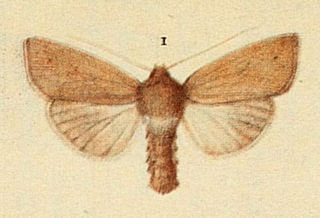
Mythimna favicolor, or Mathew's wainscot, is a moth of the family Noctuidae. The species was first described by Charles Golding Barrett in 1896. It is found in Europe. The species is sometimes treated as a subspecies of Mythimna pallens, the common wainscot.
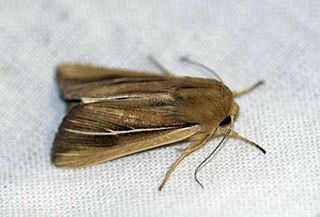
Mythimna litoralis, the shore wainscot, is a moth of the family Noctuidae.

Mythimna decisissima is a moth of the family Noctuidae first described by Francis Walker in 1856. It is found from India across south-east Asia including Hong Kong, Japan, Taiwan and Australia in Queensland and New South Wales. It is also present in South Africa.
Mythimna distincta is a moth in the family Noctuidae. It is found in India and Nepal.
Mythimna speciosa is a moth in the family Noctuidae. It is found in India.
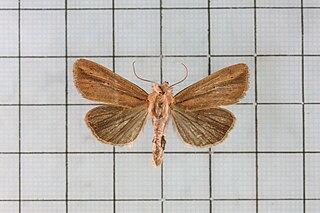
Mythimna pallidicosta is a moth in the family Noctuidae first described by George Hampson in 1894. It is found from north-eastern India to western China, Sri Lanka, Taiwan, Sundaland, Flores, the Philippines and Japan.
Mythimna borbonensis is a moth in the family Noctuidae. It is found in Réunion and Mauritius.
Leucania venalba is a moth of the family Noctuidae first described by Moore in 1867. It is found in Indo-Australian tropics of India, Sri Lanka, to Fiji and New Caledonia.
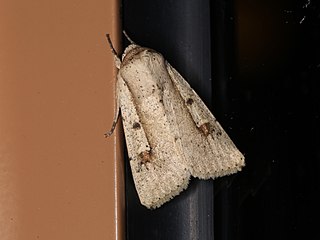
Leucania yu is a moth of the family Noctuidae first described by Achille Guenée in 1852. It is found in Oriental tropics of India, Sri Lanka, the Andaman Islands, Hong Kong, Indonesia, the Philippines, Taiwan east to Australia, Fiji and Tonga.
Mythimna consanguis is a moth of the family Noctuidae first described by Achille Guenée in 1852. It is found in Sri Lanka, India, Korea, Indonesia and Australia.
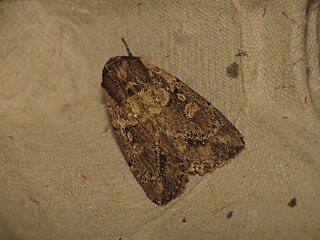
Mythimna reversa is a moth of the family Noctuidae first described by Moore in 1884. It is found in the Indian subregion, Sri Lanka, Borneo, the Philippines, Hong Kong, Malaysia and Australia.
















